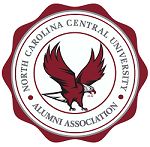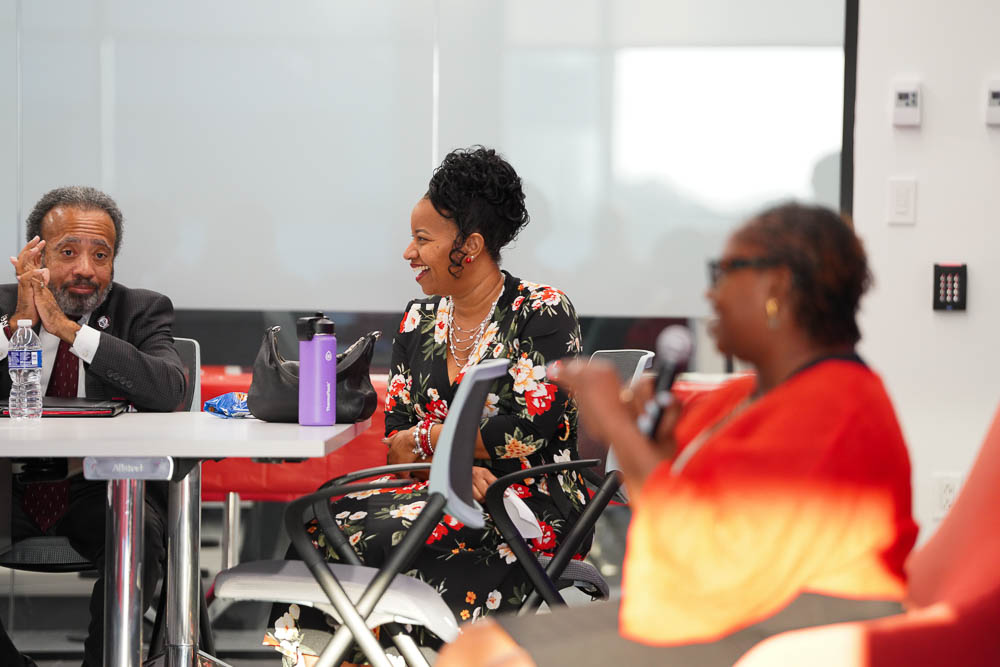About Us
EXECUTIVE LEADERSHIP
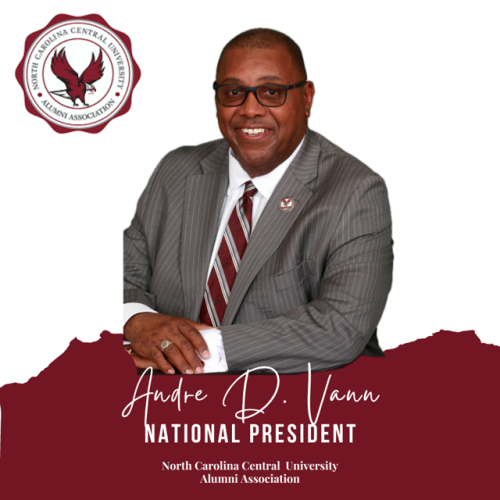
Andre Vann C’93 & C’95 - President, president@nccualumni.org
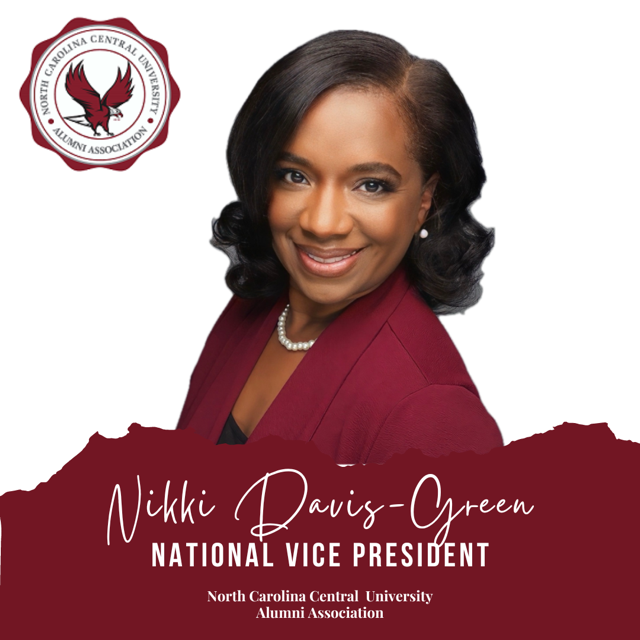
Nikki Davis-Green C’98 – Vice-President, vp@nccualumni.org

Chevella Thomas C’82, C’04 & C’06 Treasurer, treasurer@nccualumni.org
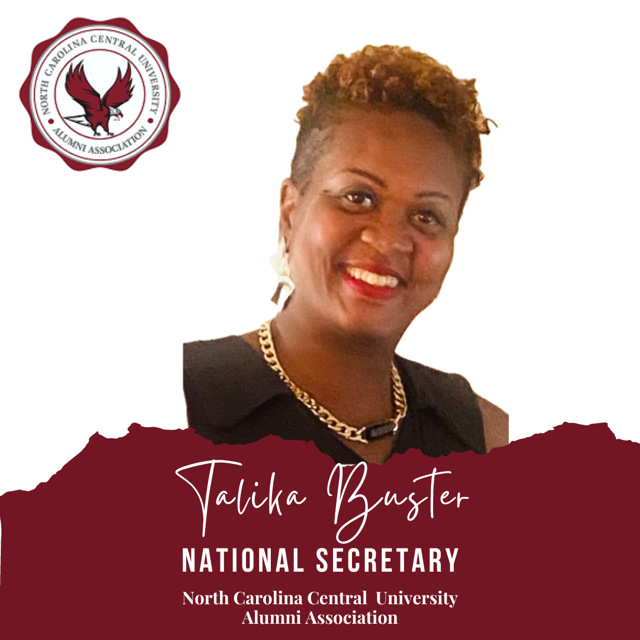
Talika Buster C’00 – Secretary, secretary@nccualumni.org
NCCUAA Regional Information
Region I: Vice President Dwayne Houston C’94 – rvpregionone@nccualumni.org
Assistant VP, Michael Crowder 00’ (Baltimore Chapter)
Secretary, Gwendolyn Gilliam-Price 82’ (Baltimore Chapter)
Treasurer, Darwin Mills 91’ (Hampton Roads Chapter)
Includes: Virginia; Metro District of Columbia area; Baltimore, Maryland; Delaware; New York; New Jersey; Philadelphia, Pennsylvania; New England States (Boston) – New Hampshire, Vermont, Maine, Rhode Island, Connecticut and Massachusetts
Region II: (Interim) Sandra Bryant Willis, C’78 – rvpregiontwo@nccualumni.org
Includes: Indiana Chapter; Chicago, Illinois; Texas Chapter; Detroit, Michigan; Los Angeles, California; St.Louis Metropolitan Area, Missouri
Region III: Vice President: Leslie Baldwin (Charlotte), RVP – rvpregionthree@nccualumni.org
Darian Street Hoover (Winston Salem), Assistant VP
Karen Davis Recording Corresponding Secretary
Abosede Copeland Assistant Secretary/Treasurer
Maryland Jones Treasurer
Includes: Alamance County/Burlington, NC; Charlotte, NC; Columbia Metro, SC; Greater Atlanta, GA; Greensboro, NC; South Ft Lauderdale/Miami, Florida; Winston-Salem, NC; Orange County, NC; Sandhills, NC/SC
Region IV: Vice President: Jonathan Leach C’04 – rvpregionfour@nccualumni.org
Stephanie Wilson-Jones C’04, Region Assistant Vice President
Curtis Forbes C’71, Assistant Secretary
Grace Wilson C’74, Assistant Treasurer Vacant
Parliamentarian
Includes: Cape Fear Area Alumni, Durham, NC, Elizabeth City Area, Fayetteville, NC; Goldsboro-Wayne County, NC: Halifax-Northampton County, NC; Nash-Edgecombe County, NC; Nursing Alumni; Pitt County/Greenville, NC; Raleigh-Wake County, NC; Roxboro-Person County, NC; Sampson County, NC; Wilson County, NC
This history of the North Carolina Central University Alumni is marked by friendship, fellowship, continual growth and fierce school pride. North Carolina Central University, a state-supported liberal arts institution, was chartered in 1909 as a private institution and opened to students on July 10, 1910. It was founded by Dr. James E. Shepard. From the beginning, when it was known as the National Religious Training School and Chautauqua, it’s purpose has been the development in young men and women of the character and sound academic training requisite for real service to the nation. To this end, the training of all students has been entrusted to the most capable teachers available.
In 1915 the school was sold and reorganized, then becoming the National Training School. During this period of its history, Mrs. Russell Sage of New York was a generous benefactor of the school.
In 1923 the General Assembly of North Carolina appropriated funds for the purchase and maintenance of the school; thus in that year it became a publicly-supported institution, and was renamed Durham State Normal School. Two years later, the General Assembly converted the institution into the North Carolina College for Negroes, dedicating it to the offering of liberal arts education and the preparation of teachers and principals of secondary schools. North Carolina College for Negroes became the nation’s first state-supported liberal arts college for African-American students.
At its 1927 session, the General Assembly began a program of expansion of the college plant to conform to the needs of an enlarged academic program. The interest of the Honorable Angus W. McLean, the Governor of North Carolina, and his belief in the institution aided greatly in the promotion of this program. State appropriations were supplemented by a generous gift from B. N. Duke, and contributions from citizens of Durham in 1929. The 1930’s afforded federal grants and State appropriations for a new program of physical expansion and improvement of educational facilities; this program continued until the beginning of World War II.
Little is known about the first alumni meeting or chapter, but the NCCU Alumni Association was founded in 1925, committed to supporting the University, our students and alumni.
The NCCU Alumni Association became a tax-exempt nonprofit organization in October 1972.
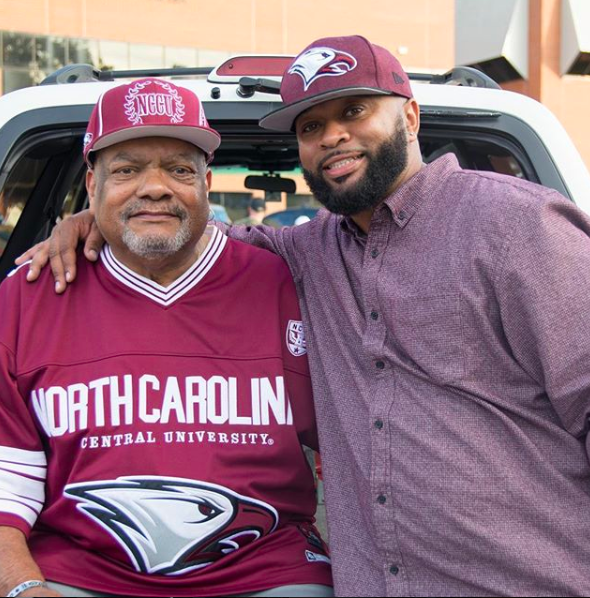
The following is a list of all Presidents of the North Carolina Central Alumni Association:
| President | Class | Term |
| Richard L. McDougald* | 1918 | 1925-1927 |
| Dr. James M. Hubbard* | 1915 | 1927-1929 |
| Richard L. McDougald* | 1918 | 1929-1936 |
| George A. Harper* | 1929 | 1936-1937 |
| Dr. James M. Hubbard* | 1915 | 1937-1939 |
| Irwin R. Holmes* | 1934 | 1940-1942 |
| Asa T. Spaulding, Sr* | 1925 | 1944-1951 |
| James T. Taylor* | 1917 | 1951-1954 |
| Irwin R. Holmes* | 1934 | 1954-1956 |
| Thomas E. Malone* | 1948 | 1956-1957 |
| William W. Marsh, II | 1953 | 1957-1961 |
| George S. Nixon* | 1953 | 1961-1964 |
| Charles H. Strayhorne* | 1956 | 1964-1966 |
| Moses C. Burt, Jr.* | 1953 | 1966-1967 |
| Henry M. Michaux, Jr. | 1952 | 1967-1970 |
| William P. Evans* | 1962 | 1970-1971 |
| Lawrence G. Cooper, Jr.* | 1954 | 1971-1977 |
| Roger R. Gregory* | 1971 | 1977-1982 |
| Dora E. Carrington* | 1959 | 1982-1986 |
| Peggy M. Ward | 1976 | 1986-1988 |
| David L. Avery | 1963 | 1988-1992 |
| Ronald H. Gantt* | 1973 | 1992-1994 |
| Roger R. Gregory* | 1971 | 1994-1998 |
| Kay Thompson Thomas | 1966 | 1998-2002 |
| Melvin F. White | 1970 | 2002-2006 |
| Richard D. Smith | 1981 | 2006-2010 |
| Tania B. Davis | 1994 | 2010-2014 |
| Calvin Kearney | 1971 | 2014-2015 |
| David L. Avery | 1963 | 2015-2016 |
| Samuel E. Cooper | 1980 | 2016-2020 |
| Tomeika A. Bowden | 2000 | 2020-2024 |
| Andre Vann | 2024-Present |
* deceased
ALMA MATER
I
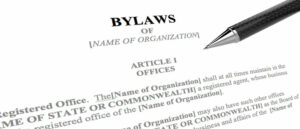
The NCCU Alumni Association fulfills its mission through committees which are open to all active NCCU alumni who would like to get involved in the work we do to support the University, students and each other.
Individuals seeking to join a committee should email info@nccualumni.org. Active participation is required. The time commitment is approximately 3-5 hours a month, and could increase or decrease depending on the projects the committee takes on.
Learn how you can get involved by contacting us at info@nccualumni.org.
Executive Committee
Member limit: 12, includes the Assistant Secretary, Parliamentarian, the Director of Alumni Relations, and the Legal Advisor.
Who may join: Alumni Council term members are elected to this committee
Purpose: Prepare and present an annual program for the Association, oversee all standing and special committees of the Council, receive (but not approve or adopt) appropriate reports from the other standing and special committees of the Council, oversee the preparation of the agendas for Council Meetings, the Annual Meeting/National Convention and oversee budget expenditures as approved by the Alumni Council/Association.
Time commitment: 1 hour/month
Nominations Committee
Member limit: 5
Who may join: Chair is selected by the Executive Committee, Director of Alumni Relations, and financial members of the Alumni Association
Purpose: Prepare a list of nominees for all offices of the Association and members at large of the Alumni Council.
Time commitment: 1 hour/month (more during election years). Elections are held during even number years (ex. 2022, 2024)
Alumni Scholarships Committee
Member limit: 5
Who may join: Director of Admissions, Director of Alumni Relations Members, and members of the NCCU Alumni Association
Purpose: Recommend to the Council the students to receive financial aid through the Alumni Scholarship program and the amount of aid each shall receive, the standards, policies, and procedures by which the scholarships are available and the amount of money that should be allocated to scholarship.
Time Commitment: 1 hour/month
Budget and Finance Committee
Member limit: 6
Who may join: Treasurer of the Association, Chair of the Fundraising Committee, and members of the NCCU Alumni Association
Purpose: Prepare a budget for the fiscal year, to provide liaison between the National Fundraising leadership and the Council, to report to the Council on the progress of the fund drive, to consider recommendations for allocation of unrestricted contributions to the Alumni Fund, and to advise the President and the Council on matters of fiscal policy. Also, the Committee will conduct an annual review of the adequacy of the Association’s internal financial controls; review with the Association’s independent public accountants the annual audit program and the Association’s financial statements for presentation to the Executive Committee; and recommend to the Executive Committee the selection of the Association’s independent public accountants.
Time Commitment: 1 hour/month
Memorials and Awards Committee
Member Limit: 5
Who may join: 2-3 members that currently serve on the Committee and members of the NCCU Alumni Association
Purpose: Select the recipients of awards. Make recommendations to the Council about the standards, policies, and procedures for Alumni Awards; to codify these standards, policies and procedures in writing; and to maintain complete records, to be regarded as confidential, on all individuals considered for an award. Plan and host the Alumni Memorials and Awards event.
Time commitment: 1 hour/month
Homecoming/Alumni Weekend Committee
Member limit: 4
Who may join: One member of the Alumni Council and members of the Alumni Association
Purpose: To plan and carry out alumni activities during Homecoming Weekend and Alumni Weekend; to serve as liaison and coordinate activities with the student committee on Homecoming; to publicize Homecoming and promote alumni attendance; and to seek ways to improve Homecoming and foster interest and participation by alumni.
Time commitment: 1 hour/month
Bylaws Committee
Member limit: 5
Who may join: Members of the NCCU Alumni Association
Purpose: Receive recommendations for additions/changes in these Bylaws from the active members/chapters and to make periodic reports to the Council regarding any recommendations or findings it might have. The Committee shall make restatements of the Bylaws as needed upon the approval of the Alumni Council.
Time commitment: 1 hour/month
Fundraising Committee
Member limit: 5
Who may join: Members of the NCCU Alumni Association
Purpose: Submit recommendations for the development and coordination of the Association’s programs as related to fundraising and other activities, which help or assist the Association in attaining its financial objectives.
Time commitment: 1 hour/month
Membership Committee
Member limit: 5
Who may join: Members of the NCCU Alumni Association
Purpose: Advise the Association on strategies to solicit new members and memberships; publicity and promotion for membership drives; and the reclamation of inactive members.
Time commitment: 1 hour/month
Resolution Committee
Member limit: 5
Who may join: Members of the NCCU Alumni Association
Purpose: Screen and formulate recommendations on all resolutions, those duly submitted and those designated as Emergency Resolutions; present their recommendations to the Executive Committee and membership; develop new resolutions to be presented to the Executive Committee and communicate with affected members to solicit comments and feedback on the proposed resolution; share feedback with the Executive Committee; and prepare or refine a rationale for each new resolution, including its impact on the Association.
Time commitment: 1 hour/month
Truth and Service Committee
Member limit: 5
Who may join: Members of the NCCU Alumni Association
Purpose: Lead the Association in opportunities to give back to the University and our local communities; focus on enhancing the Association’s culture of giving back to the university by identifying opportunities and strategies to promote alumni giving through events and volunteer opportunities; make meaningful connections with alumni and alumni supporters to obtain charitable donations; advise on messaging pertaining to giving back to the university and partner with diverse campaigns to disseminate their message; and review current initiatives to give back to the university and how they can be revised for greater impact.
Time commitment: 1 hour/month
Audit Committee
Member limit: 5
Who may join: Members of the NCCU Alumni Association
Purpose: Responsible for the review of the association’s accounting process; making recommendations for changes/modifications in record keeping and financial reporting; and encompasses oversight responsibilities, including fraud prevention and ethics. The Audit Committee, at the close of each fiscal year, shall conduct an internal audit of the records of the Treasurer. Records shall be audited after each election and prior to the start of the new administration on July 1. The Audit Committee should oversee the accuracy of the Association’s financial statements and reports. The Committee may also be charged with auditing the expenses of the President, Executive Board, and all transactions of the NCCU Alumni Association. Additionally, the Audit Committee will choose the auditors.
Time commitment: 1 hour/month
Marketing/Communications Committee
Member Limit: 5
Who may join: Members of the NCCU Alumni Association
Purpose: Manage the Association’s digital channels, promote and highlight alumni activities, and support event planning
Time commitment: 2 hours/month
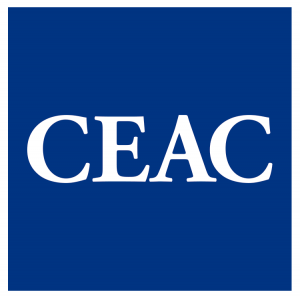
NCCUAA CEAC Mission Statement
Civic Engagement & Advocacy Committee (CEAC)
National Chairperson, Geri Norris Simmons
To educate, organize, mobilize, and empower alumni, students, and community members to use their voices and presence to engage with elected officials at the local, state, and national levels in a strategic and unified manner throughout the democratic process. This includes the development of useful strategies and processes that foster accountability and support for the issues and needs of our University and surrounding communities.
To view the complete CEAC package, click HERE to download our materials.
Contact: National Chairperson, Geri Norris Simmons – Gerisimmons@infionline.net
For additional information about the NCCUAA CEAC contact:
Office
North Carolina Central University Alumni Association, Inc.
2223 Fayetteville Street
Durham, NC 27707
919-530-5222
Your Vote Matters

Register to Vote here: https://www.vote.org/register-to-vote/
Confirmed you are registered to vote here: https://www.vote.org/am-i-registered-to-vote/
The Issues
COVID-19 has only served to unmask inequities that have existed for hundreds of years. We must work year-round to dismantle barriers that prevent Black communities from exercising their right to vote to reform inequalities in our public schools, criminal justice system, and economic opportunity.
Voting Rights
Educational Equality
Economic Equality and Access to Capital
Criminal Justice Reform
_____________________________________________________________________________________
How Can Alumni Chapters or Alumni Get Involved?
- Create a standing CEAC within your chapter. The committee should focus on voter registration, education and mobilization
- Participate in NAACP meetings to keep your organization abreast of its civic engagement activities
- Committee members should track their volunteer hours and volunteer 8-24 hours every election cycle
- Volunteer with the NAACP, Board of Elections, or other nonpartisan organizations (e.g., When We All Vote)
- Track your volunteer hours and program activities and share your information and event announcements with the association
Learn more, visit http://greaterdiversity.com/call-to-colors/ and http://greaterdiversity.com/student-engagement/.
Your Donations can Change the Lives of Many.
Contact Us
-
-
-
2008 Fayetteville Street, Durham, NC 27707
